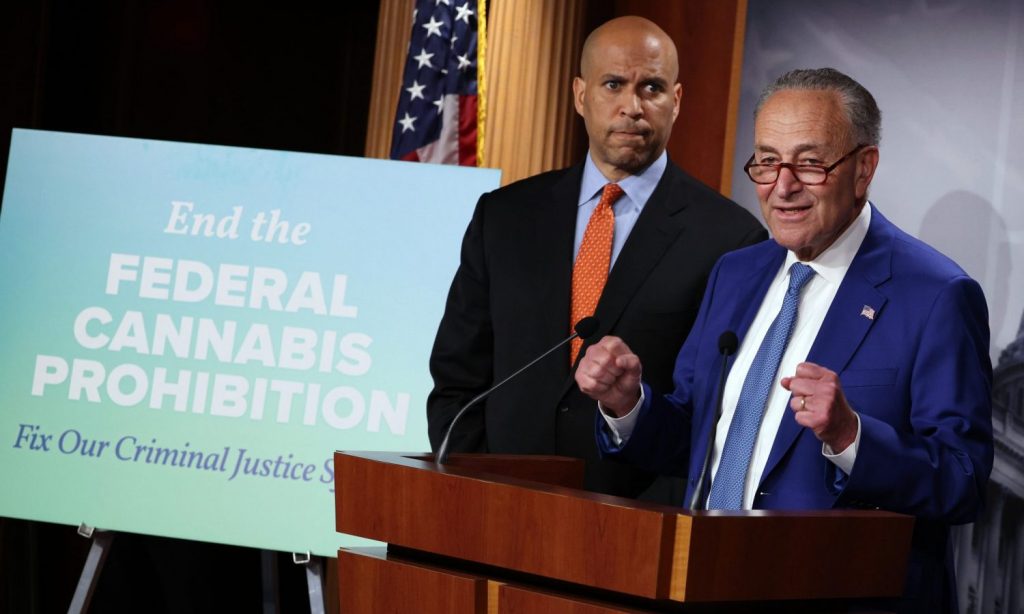The locals can be extremely rough on cannabis businesses and their budgets, and even the passage of Chuck Schumer’s legalization bill won’t change that for the foreseeable future (for better or worse).
Who decides the future of Cannabis? Nationwide, cannabis companies and advocates are hailing the Cannabis Administration and Opportunity Act as the savior of the future of cannabis (a copy of the bill is here). If the Act passes, we will finally have federal legalization and the consequences of the current federal conflict will end, or, at least be reversed in the minority of states that continue to outlaw the plant locally.
Such a development would, of course, be huge. With IRC 280E no longer an issue, cannabis companies would have the unfettered ability to secure banking outside of the 2014 FinCEN Guidelines, which means no more all-cash transactions; they would have the ability to raise institutional capital without the threat of criminal liability, etc etc. However, even if the Act passes (and chances of that happening appear slimmer by the month), what’s not going to change (probably forever) is the power of local governments to make or break America’s cannabis businesses.

For the longest time, I’ve preached that the states are in total control of these unique democratic experiments, and they definitely are where they control license categories, compliance standards, taxes, reporting requirements, etc., but that power is ultimately limited by cities and counties. And the Act gives major deference to the states to keep up their independent cannabis regimes.
The catch is that all states pay some (or more like a lot of) credence to local control because of the inherent police powers granted to cities and counties to protect the health and welfare of their citizens. I can’t name a state where local control hasn’t mainly caused major issues for cannabis operators (retail, in particular, gets the short end of the stick in most cities and counties). Cannabis businesses need to realize now that even if the Act passes and even if states maintain their current licensing systems, the cities and counties are going to remain one of biggest barriers to entry.
The notorious trend among cities and counties is to either have an “all open” policy to allow the establishment and operation of all license types, restricting the businesses only by property buffer requirements and/or zoning limitations, or to be incredibly selective about the license types they allow within their borders, creating tall barriers to entry (or, worse, to not allow any commercial cannabis activity at all, which is their right).
Here are some of the local barriers to entry that operators will probably run into indefinitely regardless of federal legalization:
License caps. Even if the state government doesn’t institute a cap by license category, cities and counties often instate caps to prevent significant environmental and other impacts resulting from too many licensees or too many of a given license type in their borders.
Local entitlements. If a city or county allows for the establishment and operation of cannabis businesses, it will have a local entitlement process that the cannabis business must clear to operate. In each city and county, this process will be different when it comes to timeline and costs.
Some jurisdictions may require a simple cannabis-oriented permit in addition to secure traditional permitting like building permits and/or conditional use permits depending on the property involved. Other jurisdictions may require a permit and a local license, which will be a parallel track that requires the submission of a variety of information about the business and the property involved.

Still, other jurisdictions may also require the applicant to execute a development agreement (see here, here, and here) that includes a litany of performance obligations. They could include anything from developing more parking to beautifying a certain stretch of neighborhood in proximity to the property on which the cannabis business operates. It could also include indemnification agreements protecting the city/county from third party claims arising from the project. To know what you’re up against, you must take the time to read the city or county’s ordinance(s) in play on the topic.
Competitive licensing. As a way to ensure that only the most well-capitalized, well-heeled operators gain a foothold in given jurisdictions, certain cities and counties implement competitive licensing, which entails operators having to spend hundreds of thousands of dollars on just the application/opportunity to operate. Oftentimes, these applicants have to submit hundreds of pages of information about themselves and their businesses that go above and beyond what any run-of-the-mill company would have to provide to acquire a city business license, including things like odor plans, capitalization plans (and proof of funds to support those plans), inventory management plans, vendor lists for certain product types, community liasion plans, etc. etc. The City of West Hollywood, California was probably the most competitive local license application I’ve ever seen in more than ten years of practice.
RELATED: Sen. Chuck Schumer’s Federal Legalization Bill Falls Flat With Marijuana Industry
Increased sin taxes. While state tax rates may (hopefully) be nominal, the locals don’t necessarily have to abide by reason. In countless cities, operators are running into aggressive gross receipts taxes and other sin taxes that just go to the city and/or county in which they operate (and that’s on top of state and federal taxes).
Locals-only ordinances. Even if a state doesn’t have a residency requirement, its cities or counties might. Operators must read local ordinances closely to see who can occupy their cap tables and stock ledgers if they want to operate in certain cities or counties. Sometimes, the directive from the local government is that a certain percentage of business ownership has to be made up of city/county locals (or you’ll get more points on your application score card if you have a local), which will force some hasty business marriages in the industry.
Increased distance requirements. State law or regulators may (and usually do) implement certain distance requirements between cannabis businesses and “sensitive uses” like schools, parks, and “youth centers”. The locals are free to be more restrictive and can tack on other sensitive uses like houses of worship or rehabilitation facilities, and they can of course up the buffer distance, too (which can effectively eliminate the establishment of cannabis businesses in entire neighborhoods).

Objections from/disputes with neighbors. State cannabis laws are not going to take into account disputes between cannabis businesses and their neighbors. However, local laws that govern cannabis businesses will always have mechanisms for angry NIMBYs to appeal the issuance of any local entitlements to cannabis businesses, which can create massive, costly delays for the cannabis operator (and in all states you need both the local entitlement and the state license to open your doors).
Bans/moratoria. While cities and counties are free to regulate cannabis businesses (including more restrictively than the state), many cities and counties in states with cannabis legalization or “medicalization” still ban commercial cannabis activity altogether. This only serves to promote the illegal market and stymie the success of these democratic experiments, which hinge a great deal on being able to provide consumers with reasonable and convenient access to cannabis and cannabis products.
RELATED: Will Schumer’s Marijuana Legalization Bill Pass Before The End Of 2021?
Worse, cities/counties often institute rolling moratoria to study the impacts of cannabis, which can take years to resolve while cannabis operators hang in limbo. Or a city or county may decide that it no longer wants any cannabis businesses in its borders and, depending on existing local laws, may declare cannabis businesses non-conforming uses with a timeline to wind them down and close them out.
Here, in California, local control has had a stranglehold on the implementation and the overall success of the Medicinal and Adult-Use Cannabis Regulation and Safety Act. That hold is loosening as more cities and counties realize that instituting cannabis businesses can be a significant financial boon without creating major societal harm. According to MJ Biz Daily, more cities are now diving in on allowing cannabis businesses (though the overall number of dispensaries in the state compared to citizens is pretty pitiful).
I’m sure California is not the only state in which this trend of tolerance is occurring. Still, cannabis operators shouldn’t rejoice too much over pending federal legislation. The locals can be extremely rough on cannabis businesses and their budgets, and even the passage of the Act won’t change that for the foreseeable future (for better or worse).
Hilary Bricken is a partner at Harris Bricken. This story was originally published on the Canna Law Blog and reposted with permission.


